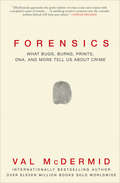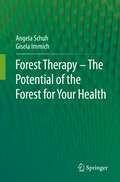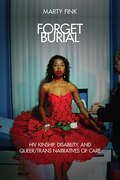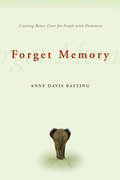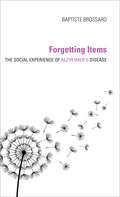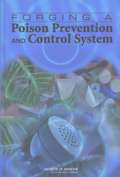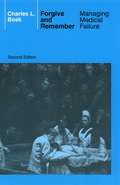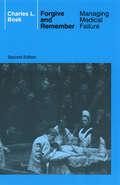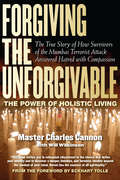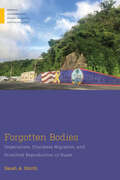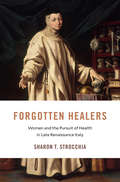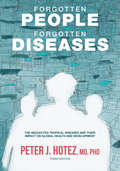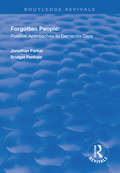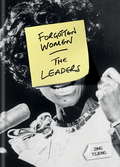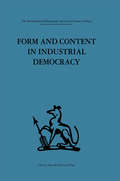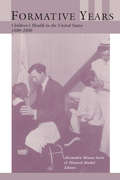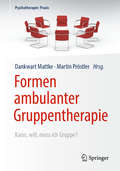- Table View
- List View
Forensics: What Bugs, Burns, Prints, DNA, and More Tell Us About Crime
by Val McDermidVal McDermid is one of the finest crime writers we have, whose novels have captivated millions of readers worldwide with their riveting narratives of characters who solve complex crimes and confront unimaginable evil. In the course of researching her bestselling novels McDermid has become familiar with every branch of forensics, and now she uncovers the history of this science, real-world murders and the people who must solve them. The dead talk to the right listener. They can tell us all about themselves: where they came from, how they lived, how they died, and, of course, who killed them. Forensic scientists can unlock the mysteries of the past and help serve justice using the messages left by a corpse, a crime scene, or the faintest of human traces. Forensics draws on interviews with some of these top-level professionals, ground-breaking research, and McDermid’s own original interviews and firsthand experience on scene with top forensic scientists. Along the way, McDermid discovers how maggots collected from a corpse can help determine one’s time of death; how a DNA trace a millionth the size of a grain of salt can be used to convict a killer; and how a team of young Argentine scientists led by a maverick American anthropologist were able to uncover the victims of a genocide. It’s a journey that will take McDermid to war zones, fire scenes, and autopsy suites, and bring her into contact with both extraordinary bravery and wickedness, as she traces the history of forensics from its earliest beginnings to the cutting-edge science of the modern day.
Forensische Psychiatrie: Leitfaden für die klinische und gutachterliche Praxis (Reihe Psychologie Ser. #41)
by Konrad von OefeleForensische Psychiatrie und Rechtswissenschaft, gesetzliche Bestimmungen und Rechtsprechung entwickeln sich ständig weiter. In den letzten Jahren wurden wesentliche Änderungen in den Bereichen Unterbringung, freiheitsentziehende sowie Behandlungsmaßnahmen unter Zwang vorgenommen. Der forensisch-psychiatrisch Tätige muss sich daher stets von neuem mit den Inhalten seines Fachgebietes auseinandersetzen und seine Kenntnisse auf dem neuesten Stand halten. Dieses Buch hält sich an allgemein akzeptierte Grundsätze und Standards der Forensischen Psychiatrie und wurde für die Neuauflage überarbeitet und aktualisiert. Es enthält eine fundierte und überschaubare Einführung ins Fachgebiet und bietet praktische Hilfe für Psychiater, die ihre Tätigkeit als Gutachter beginnen. Auch erfahrene Gutachter profitieren von der übersichtlichen Zusammenfassung der wichtigsten Grundlagen. Angehörige anderer Berufe mit Vorkenntnissen, z. B. Juristen, Sozialarbeiter und Psychologen, finden hier forensisch-psychiatrische Grundkenntnisse.
Forensische Psychiatrie: Rechtliche, klinische und ethische Aspekte
by Birgit Völlm Boris SchifferDieses Buch vermittelt alle notwendigen Grundlagen, um in der Forensischen Psychiatrie tätig werden zu können, ist aber auch für alle im Maßregelvollzug tätigen Personen mit fortgeschrittenen Kenntnissen geeignet. Es behandelt zunächst die relevanten rechtlichen Grundlagen in Deutschland, inklusive der Menschenrechte, die Begutachtung v.a. im strafrechtlichen Bereich, Theorien der Kriminalitätsentstehung sowie die Organisation von Behandlung in verschiedenen Institutionen. Der Schwerpunkt liegt auf der Vermittlung vertiefender Kenntnisse im Bereich der Behandlung von psychisch kranken Straftätern. Die Themen werden dabei von führenden nationalen und z.T. auch internationalen Experten dargestellt: Sie bieten aktuelles Wissen, insbesondere für das Verständnis aller im Maßregelvollzug anzutreffenden Störungs-/Deliktgruppen, sowie detaillierte Beschreibungen der dazugehörigen evidenzbasierten Behandlungsansätze. Auch typische Probleme, etwa mit Motivation und Widerstand, Therapieresistenz oder Zwangsmaßnahmen werden in eigenen Beiträgen adressiert. Den verschiedenen Berufsgruppen, z.B. der Pflege, der Ergotherapie oder auch der Genesungsbegleitung im Maßregelvollzug werden eigene Kapitel gewidmet. Auch die Perspektive und Bedeutung von Angehörigen wird beleuchtet. Kapitel zu ethischen Fragen, zu internationalen Aspekten und zur Forschung im Maßregelvollzug laden zur vertiefenden Reflexion ein. Abgerundet wird der umfangreiche Inhalt durch elektronisches Zusatzmaterial, welches den Brückenschlag zwischen Theorie und Praxis fördern soll. Dieses Buch deckt alle Inhalte ab, die zum Erwerb der Schwerpunktbezeichnung Forensische Psychiatrie erforderlich sind und eignet sich daher für Weiterbildungsassistenten, die den Erwerb dieser Schwerpunktbezeichnung anstreben.
Forest Therapy - The Potential of the Forest for Your Health
by Angela Schuh Gisela ImmichIn fast-paced everyday life, it is becoming increasingly important to find an antipole. The forest seems to be the perfect place for this - it offers balancing stimuli, health-promoting effects and its climate is proven to be effective on human health. This non-fiction book explains the background and facts about the effect of forest visits on a scientifically sound basis and sensitizes readers to the great health benefits of forest bathing (Shinrin-Yoku) and forest therapy. As an oasis of tranquility, the forest invites you to slow down, regenerate and draw new energy. Written for interested lay people - psychotherapists, doctors and other health professionals can read along. From the contents: How the forest and its climate affect us - How to discover and use the forest and its atmosphere for your health. The Authors: Prof. Dr. Dr. Angela Schuh and Gisela Immich, M.Sc., research the effects of forests and climate on health at the Ludwig-Maximilians-Universität, Munich, Germany, and develop concepts for preventive forest use as well as forest therapy. This book is a translation of the original German 1st edition Waldtherapie - das Potenzial des Waldes für Ihre Gesundheit by Angela Schuh and Gisela Immich, published by Springer-Verlag GmbH Germany, part of Springer Nature in 2019. The translation was done with the help of artificial intelligence (machine translation by the service DeepL.com). A subsequent human revision was done primarily in terms of content, so that the book will read stylistically differently from a conventional translation. Springer Nature works continuously to further the development of tools for the production of books and on the related technologies to support the authors.
Forever Ours: Real Stories of Immortality and Living from a Forensic Pathologist
by Janis Amatuzio[From the Book Jacket] As a physician, forensic pathologist, and coroner for several Minnesota counties, I have had the extraordinary privilege of caring for families and their loved ones when death comes suddenly, unexpectedly, or traumatically. My job is to speak for the dead, to solve the mystery of "What happened?" However, I have occasionally been faced with mysteries I cannot solve or explain. These experiences always baffle me, partly because as a scientist I seek to reach a reasonable degree of medical certainty, a rational explanation. But I have come to realize that for some experiences there is no explanation, just a deep knowing that I have encountered the Divine. - JANIS AMATUZIO, MD
Forget Burial: HIV Kinship, Disability, and Queer/Trans Narratives of Care
by Marty FinkQueers and trans people in the 1980s and early ‘90s were dying of AIDS and the government failed to care. Lovers, strangers, artists, and community activists came together take care of each other in the face of state violence. In revisiting these histories alongside ongoing queer and trans movements, this book uncovers how early HIV care-giving narratives actually shape how we continue to understand our genders and our disabilities. The queer and trans care-giving kinships that formed in response to HIV continue to inspire how we have sex and build chosen families in the present. In unearthing HIV community newsletters, media, zines, porn, literature, and even vampires, Forget Burial bridges early HIV care-giving activisms with contemporary disability movements. In refusing to bury the legacies of long-term survivors and of those we have lost, this book brings early HIV kinships together with ongoing movements for queer and trans body self-determination.
Forget Memory: Creating Better Lives for People with Dementia
by Anne Davis BastingMemory loss can be one of the most terrifying aspects of a diagnosis of dementia. Yet the fear and dread of losing our memory make the experience of the disease worse than it needs to be, according to cultural critic and playwright Anne Davis Basting. She says, Forget memory. Basting emphasizes the importance of activities that focus on the present to improve the lives of persons with Alzheimer's disease and other dementias.Based on ten years of practice and research in the field, Basting’s study includes specific examples of innovative programs that stimulate growth, humor, and emotional connection; translates into accessible language a wide range of provocative academic works on memory; and addresses how advances in medical research and clinical practice are already pushing radical changes in care for persons with dementia.Bold, optimistic, and innovative, Basting's cultural critique of dementia care offers a vision for how we can change the way we think about and care for people with memory loss.
Forgetting Items: The Social Experience of Alzheimer's Disease
by Baptiste BrossardA book that’s “in the upper echelons of social dementia research . . . an entertaining and revelatory contribution to the field” (Symbolic Interaction).Alzheimer’s disease has not only profound medical consequences for the individual experiencing it but a life-changing impact on those around them. From the moment a person is suspected to be suffering from Alzheimer’s or another form of dementia, the interactions they encounter progressively change. Forgetting Items focuses on that social experience of Alzheimer’s, delineating the ways disease symptoms manifest and are understood through the interactions between patients and the people around them. Mapping out those interactions takes readers through the offices of geriatricians, into patients’ narratives and interviews with caregivers, down the corridors of nursing homes, and into the discourses shaping public policies and media coverage. Revealing the everyday experience of Alzheimer’s helps us better understand the depth of its impact and points us toward more knowledgeable, holistic ways to help treat the disease.“Considers the social aspect of dementia by considering how symptoms are expressed by the individual and understood/interpreted by those close to them. The author’s goal is to help us understand common experiences associated with dementia and ways to interpret those experiences through the lens of sociology.” —ISCHP (International Society of Critical Health Psychology)
Forgetting Items: The Social Experience of Alzheimer's Disease
by Baptiste BrossardA book that’s “in the upper echelons of social dementia research . . . an entertaining and revelatory contribution to the field” (Symbolic Interaction).Alzheimer’s disease has not only profound medical consequences for the individual experiencing it but a life-changing impact on those around them. From the moment a person is suspected to be suffering from Alzheimer’s or another form of dementia, the interactions they encounter progressively change. Forgetting Items focuses on that social experience of Alzheimer’s, delineating the ways disease symptoms manifest and are understood through the interactions between patients and the people around them. Mapping out those interactions takes readers through the offices of geriatricians, into patients’ narratives and interviews with caregivers, down the corridors of nursing homes, and into the discourses shaping public policies and media coverage. Revealing the everyday experience of Alzheimer’s helps us better understand the depth of its impact and points us toward more knowledgeable, holistic ways to help treat the disease.“Considers the social aspect of dementia by considering how symptoms are expressed by the individual and understood/interpreted by those close to them. The author’s goal is to help us understand common experiences associated with dementia and ways to interpret those experiences through the lens of sociology.” —ISCHP (International Society of Critical Health Psychology)
Forging a Poison Prevention and Control System
by Committee on Poison Prevention ControlPoisoning is a far more serious health problem in the U.S. than has generally been recognized. It is estimated that more than 4 million poisoning episodes occur annually, with approximately 300,000 cases leading to hospitalization. The field of poison prevention provides some of the most celebrated examples of successful public health interventions, yet surprisingly the current poison control “system” is little more than a loose network of poison control centers, poorly integrated into the larger spheres of public health. To increase their effectiveness, efforts to reduce poisoning need to be linked to a national agenda for public health promotion and injury prevention. Forging a Poison Prevention and Control System recommends a future poison control system with a strong public health infrastructure, a national system of regional poison control centers, federal funding to support core poison control activities, and a national poison information system to track major poisoning epidemics and possible acts of bioterrorism. This framework provides a complete “system” that could offer the best poison prevention and patient care services to meet the needs of the nation in the 21st century.
Forgive and Remember: Managing Medical Failure
by Charles L. BoskOn its initial publication, Forgive and Remember emerged as the definitive study of the training and lives of young surgeons. Now with an extensive new preface, epilogue, and appendix by the author, reflecting on the changes that have taken place since the book's original publication, this updated second edition of Charles L. Bosk's classic study is as timely as ever.
Forgive and Remember: Managing Medical Failure
by Charles L. BoskThe landmark study of how medical errors are managed among surgeons and other hospital staff—now in an updated edition with a new preface and epilogue.When it was first published, Forgive and Remember offered groundbreaking insight into the training and lives of young surgeons. It quickly emerged as the definitive sociological study on the subject. While medical errors are both inevitable and potentially devastating, Bosk found that they could be forgiven—as long as they were remembered and never repeated.In this second edition, Bosk reflects more than twenty years later on how things have changed, both in the medical profession and in sociology. With an extensive new preface, epilogue, and appendix by the author, this updated edition of Forgive and Remember is as timely as ever.
Forgiving The Unforgivable: The Power of Holistic Living
by Neale Donald Walsch Master Charles Cannon Will Wilkinson Eckhart Tolle TolleIn November, 2008, Pakistani Muslim terrorists attacked Mumbai. The 5 Star Oberoi Hotel was one of their targets. The Oberoi was also where M.C. Cannon, leader of the Synchronicity Foundation for Modern Spirituality in Virginia, and 24 of his associates were staying. Four in the group were wounded and two were killed. When rescued by SWAT teams and interviewed by the press, Synchronicity survivors expressed immediate compassion and understanding towards the terrorists. During interviews and press conferences following the attack, they repeated words of forgiveness, not accusation. This ignited an international tsunami of stunned curiosity and thousands of e-mail messages and phone calls flooded in. I am inspired by your response. How did you get to be the way you are? And, How can I learn to do that? This book is a response to those inquiries.This book uses the Mumbai siege as a context for a revolutionary explanation of what true forgiveness really is and how to live the Holistic Lifestyle in a state of awareness where true forgiveness becomes instinctive.
Forgotten Bodies: Imperialism, Chuukese Migration, and Stratified Reproduction in Guam (Medical Anthropology)
by Sarah A. SmithWomen from Chuuk, Federated States of Micronesia, who migrate to Guam, a U.S. territory, suffer disproportionately poor reproductive health outcomes. Though their access to the United States is unusually easy, through a unique migration agreement, it keeps them in a perpetual liminal state as nonimmigrants, who never fully belong as part of the United States Chuukese women move to Guam, sometimes with their families but sometimes alone, in search of a better life: for jobs, for the education system, or to access safe health care. Yet, the imperial system they encounter creates underlying conditions that greatly and disproportionately impact their ability to succeed and thrive, negatively impacting their reproductive health. Through clinical and community ethnography, Sarah A. Smith illuminates the way this system stratifies women’s reproduction at structural, social, and individual levels. Readers can visualize how U.S. imperialist policies of benign neglect control the body politic, change the social body, and render individual bodies vulnerable in the twenty-first century but also how people resist.
Forgotten Healers: Women and the Pursuit of Health in Late Renaissance Italy (I Tatti studies in Italian Renaissance history)
by Sharon T. StrocchiaIn Renaissance Italy women from all walks of life played a central role in health care and the early development of medical science. Observing that the frontlines of care are often found in the household and other spaces thought of as female, Sharon Strocchia encourages us to rethink women’s place in the history of medicine.
Forgotten People, Forgotten Diseases: The Neglected Tropical Diseases and Their Impact on Global Health and Development (ASM Books)
by Peter J. HotezThe neglected tropical diseases (NTDs) are among the most common infections of the world’s poorest people and have profound ramifications on affected populations, including physical, mental, social, and economic. This third edition of Forgotten People, Forgotten Diseases coincides with the third decade of the NTDs movement, which has given access to essential NTD preventative treatments and medications to more than 1 billion people. Professor Peter Hotez, MD, PhD, one of the founders of the NTD movement, discusses how the NTD space evolved and control was implemented against these ancient scourges, through alliances between nongovernmental development organizations and private-public partnerships. Forgotten People, Forgotten Diseases also Reports on the health and economic effects of the NTDs, and the challenges of measuring diseases that do not always kill, but adversely affect productivity, child development, pregnancy outcome, and economic development. Lays a roadmap for continued control of existing and newly identified NTDs and spotlights potential opportunities for reducing global poverty and “repairing the world.” Describes a global initiative to provide annual mass drug administration for more than one billion people affected by NTDs. Highlights the role of innovation and product development partnerships for new treatments and vaccines. Explains how science and vaccine diplomacy ensure that a new generation of biotechnologies reaches the world’s poorest people. Forgotten People, Forgotten Diseases remains an essential resource for anyone seeking insight into global advocacy coordination and mobilization of resources to combat NTDs and continues to tell the story of the world’s people who live in extreme poverty and what it means for them to live with these devastating diseases. “Like Dr. Hotez, I have struggled with how to best get the word out about our need to address NTDs and their link to poverty. Now he has provided us all with a remarkable tool, a book for people without an extensive scientific or medical background. Forgotten People, Forgotten Diseases is an excellent ‘one-stop’ primer about NTDs.”—Soledad O’Brien, Host, Matter of Fact with Soledad O’Brien
Forgotten People: Positive Approaches to Dementia Care (Routledge Revivals)
by Jonathan Parker Bridget PenhaleFirst puiblished in 1998, this book provides a professional and practical guide detailing social work interventions for people with dementia and their carers. It uses case studies from practice situations to exemplify the usefulness and potential pitfalls of a range of interventive strategies. The book includes interactive learning in the form of activities and reflections that can be undertaken individually or in small groups. Thus, it will serve a directly educative, as well as an informative function.
Forgotten Women: The Leaders (Forgotten Women Ser.)
by Zing Tsjeng'To say this series is "empowering" doesn't do it justice. Buy a copy for your daughters, sisters, mums, aunts and nieces - just make sure you buy a copy for your sons, brothers, dads, uncles and nephews, too.' - indy100The women who shaped and were erased from our history.The Forgotten Women series will uncover the lost histories of the influential women who have refused over hundreds of years to accept the hand they've been dealt and, as a result, have formed, shaped and changed the course of our futures. The Leaders weaves together 48* unforgettable portraits of the true pioneers and leaders who made huge yet unacknowledged contributions to history, including:Grace O'Malley, the 16th century Irish pirate queenSylvia Rivera, who spearheaded the modern transgender rights movementAgent 355, the unknown rebel spy who played a pivotal role in the American RevolutionNoor Inayat Khan, who went undercover to spy for the French Resistance and became Nazi enemy no. 1Amina of Zazzau, the formidable ancient Muslim warrior queen of Northern NigeriaChapters including Rebels; Warriors; Rulers; Activists and Reformers shine a spotlight on the rebellious women who defied the odds, and the opposition, to change the world around them. *The number of Nobel-prize-winning women.
Forgotten Women: The Leaders (Forgotten Women)
by Zing TsjengSelected for the Evening Standard present gift guide of the year'To say this series is "empowering" doesn't do it justice. Buy a copy for your daughters, sisters, mums, aunts and nieces - just make sure you buy a copy for your sons, brothers, dads, uncles and nephews, too.' - indy100'Here's to no more forgotten women.' Evening StandardThe women who shaped and were erased from our history.The Forgotten Women series will uncover the lost histories of the influential women who have refused over hundreds of years to accept the hand they've been dealt and, as a result, have formed, shaped and changed the course of our futures. The Leaders weaves together 48* unforgettable portraits of the true pioneers and leaders who made huge yet unacknowledged contributions to history, including:Grace O'Malley, the 16th century Irish pirate queenSylvia Rivera, who spearheaded the modern transgender rights movementAgent 355, the unknown rebel spy who played a pivotal role in the American RevolutionNoor Inayat Khan, who went undercover to spy for the French Resistance and became Nazi enemy no. 1Amina of Zazzau, the formidable ancient Muslim warrior queen of Northern NigeriaChapters including Rebels; Warriors; Rulers; Activists and Reformers shine a spotlight on the rebellious women who defied the odds, and the opposition, to change the world around them. *The number of Nobel-prize-winning women.
Form and Content in Industrial Democracy: Some experiences from Norway and other European countries (International Behavioural And Social Sciences Ser. #Vol. 46)
by F E Emery Einar Thorsrud Eric TristTavistock Press was established as a co-operative venture between the Tavistock Institute and Routledge & Kegan Paul (RKP) in the 1950s to produce a series of major contributions across the social sciences. This volume is part of a 2001 reissue of a selection of those important works which have since gone out of print, or are difficult to locate. Published by Routledge, 112 volumes in total are being brought together under the name The International Behavioural and Social Sciences Library: Classics from the Tavistock Press. Reproduced here in facsimile, this volume was originally published in 1969 and is available individually. The collection is also available in a number of themed mini-sets of between 5 and 13 volumes, or as a complete collection.
Formal Methods for the Analysis of Biomedical Ontologies (Synthesis Lectures on Data, Semantics, and Knowledge)
by Guo-Qiang Zhang Rashmie Abeysinghe Licong CuiThe book synthesizes research on the analysis of biomedical ontologies using formal concept analysis, including through auditing, curation, and enhancement. As the evolution of biomedical ontologies almost inevitably involves manual work, formal methods are a particularly useful tool for ontological engineering and practice, particularly in uncovering unexpected "bugs" and content materials. The book first introduces simple but formalized strategies for discovering undesired and incoherent patterns in ontologies before exploring the application of formal concept analysis for semantic completeness. The book then turns to formal concept analysis, a classical approach used in the mathematical treatment of orders and lattices, as an ontological engineering principle, focusing on the structural property of ontologies with respect to its conformation to lattice or not (non-lattice). The book helpfully covers the development of more efficient algorithms for non-lattice detection and extraction required by exhaustive lattice/non-lattice analysis. The book goes on to highlight the power and utility of uncovering non-lattice structure for debugging ontologies and describes methods that leverage the linguistic information in concept names (labels) for ontological analysis. It also addresses visualization and performance evaluation issues before closing with an overview and forward-looking perspectives on the field. This book is intended for graduate students and researchers interested in biomedical ontologies and their applications. It can be a useful supplement for courses on knowledge representation and engineering and also provide readers with a reference for related scientific publications and literature to assist in identifying potential research topics. All mathematical concepts and notations used in this book can be found in standard discrete mathematics textbooks, and the appendix at the end of the book provides a list of key ontological resources, as well as annotated non-lattice and lattice examples that were discovered using the authors' methods, demonstrating how "bugs are fixed" by converting non-lattices to lattices with minimal edit changes.
Formalin-Fixed Paraffin-Embedded Tissues
by Fahd Al-MullaPresenting an area of research that intersects with and integrates diverse disciplines, including genomics, epigenetics, proteomics, and cellular biology, among others, Formalin-Fixed Paraffin-Embedded Tissues: Methods and Protocols collects contributions from expert researchers in order to provide practical guidelines to this complex study. Compiled in order to provide researchers with up-to-date methodological information pertaining to the utilization of genomic, transcriptomic, and proteomic data in diagnosis, prognosis, and tailored therapy, the ultimate aim of this volume is to decipher diseases at a molecular level. Divided into multiple convenient chapters, this detailed book covers various techniques to construct and utilize tissue arrays, it also provides detailed protocols in immunohistochemistry, immunofluorescence, fluorescent and chromogenic in situ hybridization, and ultimately introduces protocols for FFPET microdissection and nucleic acids extraction for their utilization in advanced techniques such as microarray CGH, DNA methylation and pyrosequencing. The volume also discusses FFPET research from an ethical standpoint and concludes with a chapter on novel tissue fixative. Written in the highly successful Methods in Molecular BiologyTM series format, chapters contain introductions to their respective topics, lists of the necessary materials and reagents, step-by-step, readily reproducible laboratory protocols, and notes on troubleshooting and avoiding known pitfalls. Authoritative and accessible, Formalin-Fixed Paraffin-Embedded Tissues: Methods and Protocols serves as a practical guide for scientists of all backgrounds and aims to convey the appropriate sense of fascination associated with this vital field of research.
Formation and Control of Biofilm in Various Environments
by Hideyuki Kanematsu Dana M. BarryThis book provides excellent techniques for detecting and evaluating biofilms: sticky films on materials that are formed by bacterial activity and produce a range of industrial and medical problems such as corrosion, sanitary problems, and infections. Accordingly, it is essential to control biofilms and to establish appropriate countermeasures, from both industrial and medical viewpoints. This book offers valuable, detailed information on these countermeasures. It also discusses the fundamentals of biofilms, relates various substrates to biofilms, and presents a variety of biofilm reactors. However, the most important feature of this book (unlike others on the market) is its clear focus on addressing the practical aspects from an engineering viewpoint. Therefore, it offers an excellent practical guide for engineers and researchers in various fields, and can also be used as a great academic textbook.
Formative Years: Children's Health in the United States, 1880-2000
by Howard Markel Alexandra Minna SternAlexandra Minna Stern is Associate Director of the Center for the History of Medicine and Assistant Professor of Obstetrics and Gynecology and American Culture at the University of Michigan. Howard Markel is the George Edward Wantz Professor of the History of Medicine, Professor of Pediatrics and Communicable Diseases, and Professor of History at the University of Michigan, and Director of the Center for the History of Medicine.
Formen ambulanter Gruppentherapie: Kann, will, muss ich Gruppe? (Psychotherapie: Praxis)
by Dankwart Mattke Martin PröstlerDieses Buch ist ein Plädoyer für Gruppenangebote in der ambulanten psychotherapeutischen Praxis. Es versammelt Grundlagen, Erfahrungen und Praxistipps für Gruppen in verschiedenen Settings, Patientengruppen und Therapieschulen und leistet einen Beitrag zur Debatte um die patientenorientierte Versorgung. Psychologische und ärztliche Psychotherapeuten sowie Psychiater erfahren, wie sie Gruppenpsychotherapie nach den Richtlinienverfahren für ihre ambulante Praxis neu entdecken, gestalten und ausbauen können. Gruppenpsychotherapien erlauben eine lebendige, bereichernde und ökonomische Anwendung von Psychotherapie bei einer Vielzahl von Problemfeldern und Störungen und sind im Hinblick auf ihre Wirksamkeit sehr gut abgesichert. Aus dem Inhalt: Psychodynamische Psychotherapie in Gruppen – Verhaltenstherapie in Gruppen – Kinder- und Jugendlichenpsychotherapie in Gruppen – Kombination von Einzel- und Gruppenpsychotherapie – Gruppenpsychotherapie in der ambulanten Rehabilitation – Praxisorganisation und Abrechnung – Stand der Forschung. Die Herausgeber: Dr. med. Dankwart Mattke ist in fachärztlicher Praxis tätig: psychosomatische Medizin, Psychiatrie, Neurologie, Psychotherapie, Psychoanalyse; zudem in eigener Beratungssozietät: Supervision, Coaching, Training, Organisations- und Teamentwicklung. Dipl.-Psych., Dipl.-Theol. Martin Pröstler ist Psychoanalytiker und Gruppenlehranalytiker, niedergelassen als Psychotherapeut, Supervisor und Organisationsberater in eigener Praxis.
